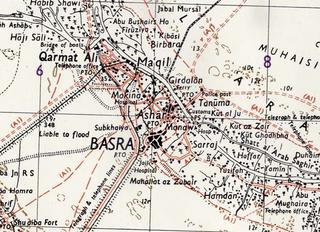Basra then and now
 After the Khyber Pass and Kacha Ghari, Walter's battalion (MGC 204) was absorbed into the 8th MGC, and they were sent to Basra in Mesopotamia (modern day Iraq). Basra is still in the news. Does anything change? What lessons were learned in 1920? 2005?
After the Khyber Pass and Kacha Ghari, Walter's battalion (MGC 204) was absorbed into the 8th MGC, and they were sent to Basra in Mesopotamia (modern day Iraq). Basra is still in the news. Does anything change? What lessons were learned in 1920? 2005?We left Kacha Ghari camp during February 1920, and we entrained for Trimulgherry in India. We had a fine old time getting our mules aboard, as they were very unpredictable. We had a few days train journey before reaching our destination. We were then absorbed into the 8th Battalion M.G.C. so the 204th Bn. lost its identity. We found life rather easier than we had been having since arriving in India last October.
The quiet atmosphere was not to last long, as in June 1920, the Arabs began to rebel in Mesopotamia. It was so serious, that an expeditionary force was sent from India to quell the disturbances. I was in “C” Company, and we were one company who had to go to Basra, together with D Company. This was an operation to deny the Arabs the water of the Nile [I think Walter means Tigris/Euphrates or the Canal to the Persian Gulf here instead of the Nile] which passed through their village. They had been wrecking the trains and pulling down the telegraph wires and also looting the trains. This operation lasted from June 1920 to March 1921, and we prepared to leave for Basra to return to India, but before doing so, we had to disinter our fallen comrades, and put their remains in coffins provided for the purpose. That was a disagreeable task. (We had an extra ration of rum that night.)
When the remains of these soldiers had been exhumed, they were placed in coffins with their particulars placed inside, together with the cross that had been erected over their graves. They were placed in the train which took them to the Military Hospital in Basra for re-burial in the Military Cemetery. That operation was a very unpleasant one that I have taken part in. It was now February 1921, and all our mules and equipment was got ready for embarkation to India. We returned to Bombay, and then on to Deolali, the “transit camp” for soldiers coming out to India, and those returning to England.
Walter and I never talked about Iraq because it wasn't really an issue in the late 1970's and early 80's. Iran and Afghanistan were the big news then. I'd love to hear his perspective on the current war with Iraq.

0 Comments:
Post a Comment
Subscribe to Post Comments [Atom]
<< Home